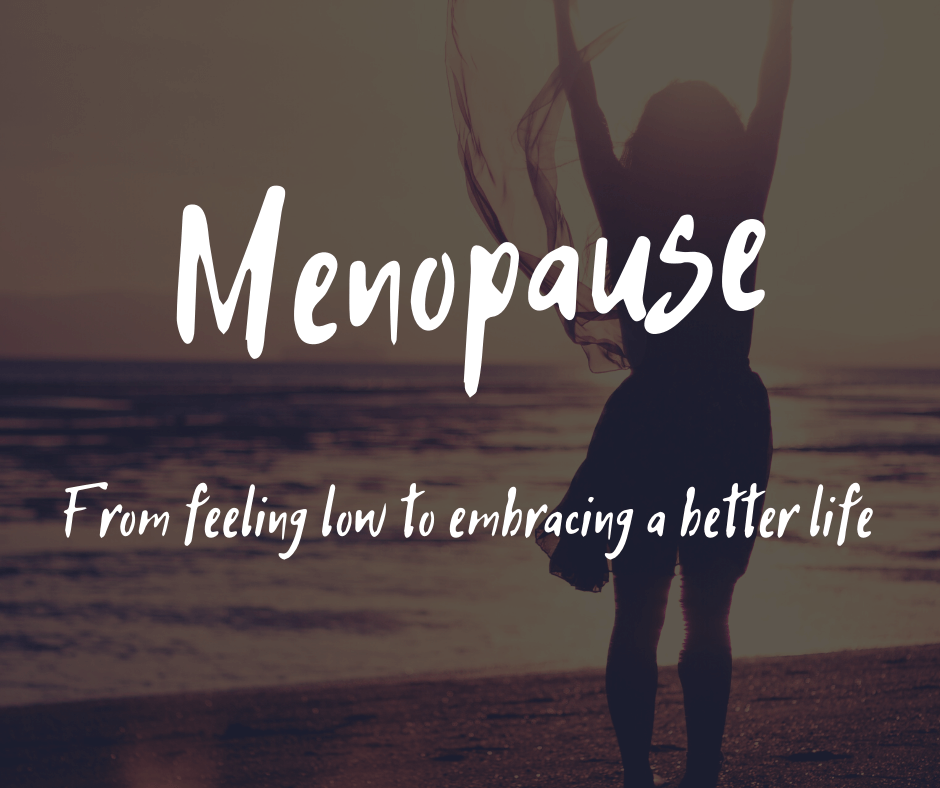
Going through the menopause can, for some women, be a true life changing phase of their life. No one likes being out of balance, especially when symptoms of menopause leave us feeling like a totally different person, sometimes disempowered and unsecure.
I am a strong believer that changes are great opportunities and this is especially true when it comes to the menopause. The heightened emotional sensitivity that women can develop during this time of their lives or the physical changes that can accompany the menopause, can be the catalysts for the changes that someone really need to make, to become healthier and to move on in life.
“Throwing blankets off at night, keeping awake, fatigue and irritation, brain fog, forgetfulness, hair falling out, bloated abdomen. They call it “the change of life” – but I feel like a different person altogether. What is happening? “
I have heard this many times from women who were led to believe that they simply had to live with the symptoms of menopause.
Unfortunately, there is lack of education about the subject and many women are simply being told that the menopausal symptoms are common.
In my opinion, common does not mean normal.
When a woman is told that her suffering is normal, we take away her right to receive treatment for her symptoms, many women develop a sense of disempowerment and start assuming that suffering is something to put on with.
Fortunately, you have a lot more control over the ups and downs of menopause than you might think and most of the bodily changes respond quite well to natural treatment approach.
The menopause it is not a single point in time when hormone production is switched off for good, but it’s a gradual evolution that brings an end to fertility.
This transition phase usually starts in the mid-40s, or for some women as early as mid-30s.
During this time there is a progressive decline in the function of the ovaries (our powerhouse of female hormones) which will eventually culminate with the cessation of ovulation (menopause).
The same hormones are also produced by the adrenal gland, although in a much smaller quantity. The natural process is for the adrenals to up regulate (increase) their activity in order to minimize the effects caused by the loss of ovarian function.
However, if the adrenals are already impaired due to prolonged stress of one sort or another, they are unable to increase their function and the result can be the development of classic symptoms of menopause.
Female hormones, although historically ascribed to strictly reproductive functions, they are also involved in many other body function such as the immune system, the synthesis of neurotransmitters, they’ re involved in memory and cognition, metabolism, they have antioxidant properties .etc…
This is why the effects of declining or unbalanced hormones is felt on many levels. Some women may find themselves feeling “tired and wired” all the time, relying on sugar and caffeine to keep going through the day and sleeping pills to get through the night. Allergies, hot flushes, asthma, chemical sensitivities and susceptibility to every cold and flu bug … etc. Does it sound familiar?
Many of my patients often ask me why some people suffer more than other?
Hormone imbalance is often an appropriate response of the body to adapt or counterbalance changes occurring somewhere else into the body for example stress, infection, poor dietary choices, toxins, surgeries etc…
The hormonal change and adaptation to these stressors however, should be temporary and resolve once the underlying stressors have resolved or are removed.
My clinical observation is that women suffering from menopausal symptoms are carrying unresolved and long-standing health issues that are chronically challenging their immune and hormonal system. Upon reaching the menopausal period, shift into the immune system, driven also by the drop of estrogen, cause a decline in the general health , the hormonal imbalance become even more exaggerated and women start to experience a variety of symptoms.
Besides the hot flushes, the next most common complains many of my patients report are mood fluctuation and poor sleep.
Estrogen plays many important functions in the brain. For example, it ensures there is enough energy for optimal brain function, promotes brain cell survival, and protects it from damage.
Specifically, when there is not enough estrogen in the brain, changes arise in how the brain uses glucose – its main fuel; and in neurotransmitter functioning – the main chemical messengers that relay information within the brain and the rest of the body.
A healthy transition requires a treatment approach that is individualized and holistic. There are no 2 equal women. We all have our own unique life story, needs and health journey.
That is why during the consultation I take in depth information regarding not only current symptoms but also past medical issues as well information concerning many other aspects of your health and lifestyle, so that I can help you in the best possible way.
If you are like many of my patients, you want to get to the bottom of your health issues and embrace a healthier lifestyle, drop me an email or get in touch by calling me on 07830460483.
I am interested in hearing your story and how I can help you and guide you through a process of changes and healing.
My mission is, not only to help you recover from health concerns and pain, but to also serve as an educational and motivational resource who can help you live a fuller life. On all different levels.
Doesn’t it seem ironic that we are all taught to invest in so many areas of life, but that our own basic level of health and well-being does not make it onto the top of our priority list?
This may take a leap of faith on your part, or you may ‘get it’ already. But this has certainly been my own direct experience, along with so many of the patients I have worked with over the years. When you invest in your health, every other aspect of your life becomes that much more abundant, fulfilling, and successful. This is because your health is the foundation for every aspect of your life.
I have seen many women regaining control of their lives and develop a renewed sense of purpose once we started to work together on a journey of changes towards a better health.
So, if there’s something inside of you that knows how important your health is and how being proactive about it will only lead to amazing outcomes in many facets of your life, then i invite you to contact me to discuss how I can help you.
Feel free to tag your friend who might benefit from reading this article.
To your health,
Paola
Paola Pizzuto is a registered Osteopath in Edinburgh with a commitment and dedication to helping people achieve better health.
Connect with me on Facebook where I share lots of useful information.
Freedman, R.R., Menopausal hot flashes: mechanisms, endocrinology, treatment. J Steroid Biochem. Mol. Biol
Brinton, R.D., et al., Perimenopause as a neurological transition state. Nat. Rev. Endocrinol, 7/2015.
Rettberg JR, Yao J, Brinton RD: Estrogen: a master regulator of bioenergetic systems in the brain and body. Front Neuroendocrinol
Rasgon NL, Silverman D, Siddarth P : Estrogen use and brain metabolic change in postmenopausal women. Neurobiol Aging
 Receive for free the e-book I have specifically written for you, to help you learn more about the uniqueness and preciousness of your body and start a new journey of greater health and happiness. Your email is not shared with third parties and stored a GDPR compliant service provider (AWeber).
Receive for free the e-book I have specifically written for you, to help you learn more about the uniqueness and preciousness of your body and start a new journey of greater health and happiness. Your email is not shared with third parties and stored a GDPR compliant service provider (AWeber).